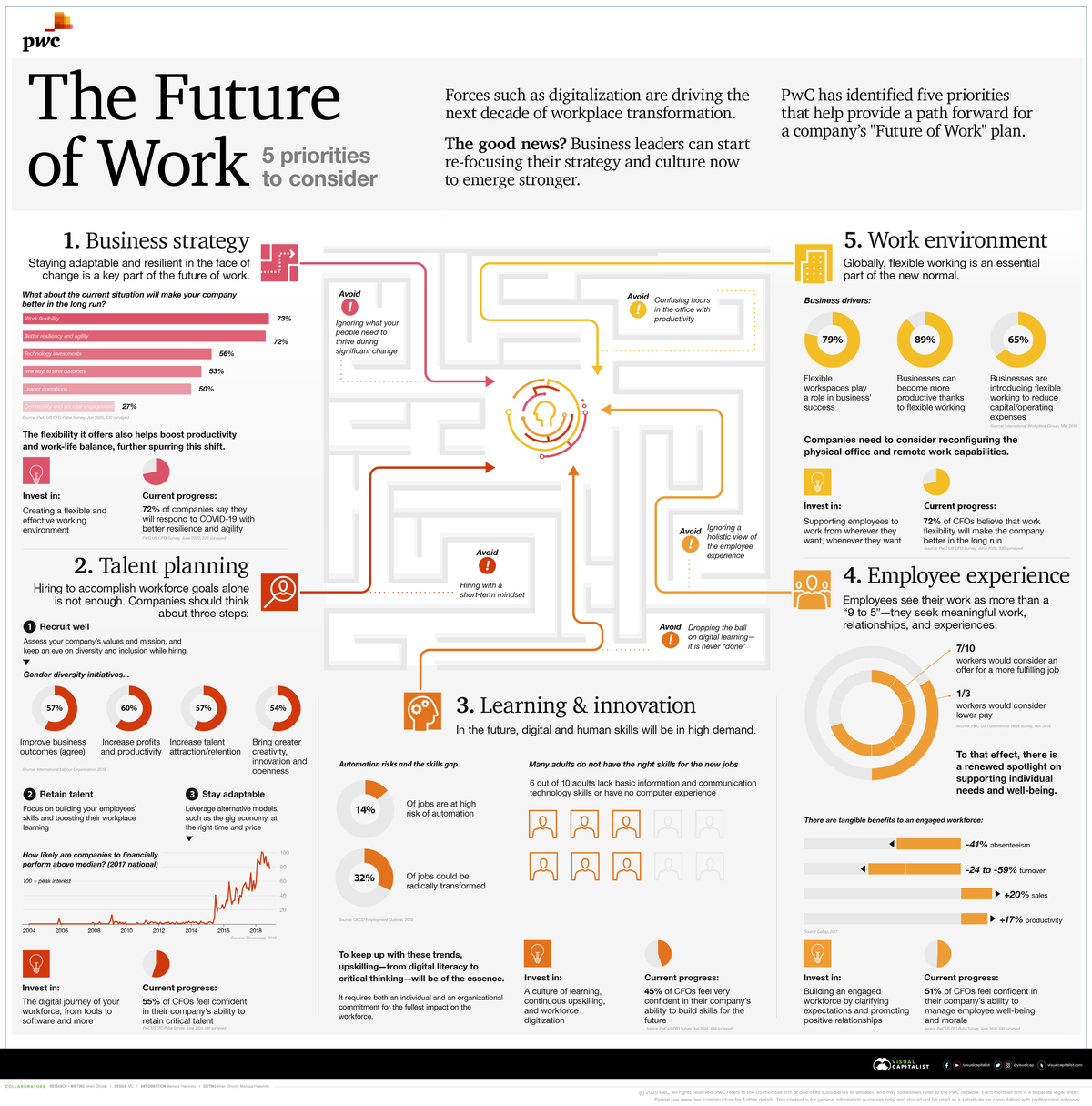Five Business Priorities for the Future of Work
Published on October 6, 2020 by Sponsored Content

COVID-19 is ushering in an entirely different future in terms of working life. However, forces such as digitalization have been altering the workforce long before the pandemic.
OECD research suggests that 31% of jobs could be radically transformed as a result of automation. At the same time, specialized jobs are being created elsewhere. These big picture trends mean that many organizations are already preparing for a now-accelerated future.
This infographic from PwC identifies five priorities that can help provide a path forward for a company’s Future of Work plan—strengthened by responses from an ongoing survey of U.S. CFOs on their workforce strategy.
1. Business Strategy
According to the survey, 72% of U.S. chief financial officers (CFOs) say they that responding to COVID-19 with better resilience and agility will be a key factor to their company’s improvement in the long run.
| Factor | % Respondents |
|---|---|
| Work flexibility | 73% |
| Better resilience and agility | 72% |
| Technology investments | 56% |
| New ways to serve customers | 53% |
| Leaner inspirations | 50% |
| Community and societal engagement | 27% |
Flexible ways of working, such as telecommuting or shorter workweeks, also can help improve productivity and work-life balance, further spurring this shift. Companies should avoid ignoring the needs of employees and invest in creating a thriving work environment.
2. Talent Planning
Hiring to accomplish workforce goals alone is not enough. Companies should think about three steps when building a strong talent pool:
Hiring to accomplish workforce goals alone is not enough. Companies should think about three steps when building a strong talent pool:
- Recruit well
Assess your company’s values and mission, and keep an eye on diversity and inclusion while hiring. For example, it’s been proven that gender diversity initiatives are good for the bottom line, improving outcomes and increasing profits and productivity.
- Retain talent
At present, 55% of CFOs don’t feel very confident in their company’s ability to retain critical talent. Organizations should avoid hiring with a short-term mindset. Instead, focus on building employees’ skills, with emphasis on upskilling in digital tools and software. - Stay adaptable
Businesses are increasingly leveraging the gig economy, as alternative models grow in popularity.
3. Learning & Innovation
Despite incoming automation threats, six in ten adults still lack basic information and communications skills. The good news? In the future, both digital and human skills will be in high demand.
To keep up with these trends, upskilling—ranging from digital literacy to critical thinking—will be of the essence. It requires both an individual and an organizational commitment to create a culture of learning in the workforce.
Currently, only 45% of CFOs feel very confident in their company’s ability to build the necessary skills for the future.
4. Employee Experience
These days, employees rarely approach their work as only a “Nine to Five” job. Instead, they seek meaningful work, relationships, and experiences—PwC notes that one in three workers would be willing to consider lower pay for a more fulfilling job.
To that effect, there is a renewed spotlight on supporting individual needs and well-being. There are tangible benefits to an engaged workforce:
- 41% reduction in absenteeism
- 24-59% less turnover
- 20% increase in sales
- 17% increase in productivity
For future success, organizations should build a holistic view of the employee experience. To that end, 49% of CFOs do not feel confident in their company’s ability to manage employee well-being and morale.
5. Work Environment
Flexible work is an essential component of the future of business, and it seems that it’s here to stay. 72% of CFOs believe that work flexibility will make their company better in the long run.
This drives home the urgent need to reconfigure the traditional office and bolster remote work capabilities—enabling employees to work from wherever they want, whenever they want.
It’s clear the Future of Work discussion isn’t happening in a bubble—these alternative workforce needs are simply speeding up the inevitable transition.
Many companies only focus on two or three of the above priorities, but aligning all five will be crucial for the future of work.
Note: All statistics are from the same PwC U.S. CFO Pulse survey unless otherwise stated.
PwC surveyed 330 US CFOs and finance leaders between June 8-11, 2020. 88% percent of the respondents were from public and private companies in these top five sectors: health industries (9%), consumer markets (13%), financial services (23%), industrial products (23%), and technology, media and telecommunications (20%). Twenty-nine percent of respondents were from Fortune 1000 companies. The PwC CFO Pulse Survey is conducted on a periodic basis to track changing sentiment and priorities. Now in its sixth installment, the inaugural survey was conducted March 9-11, 2020.
